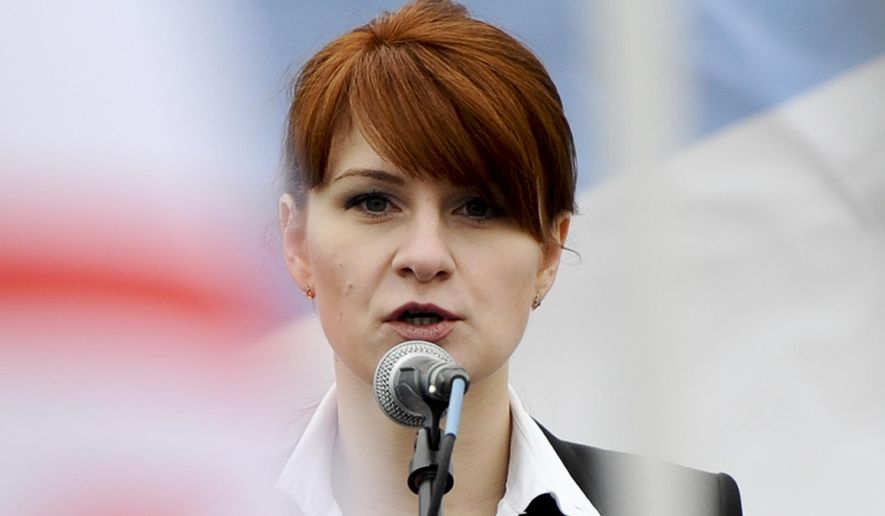Maria Butina, the Russian woman who failed to register as a foreign agent and plotted to infiltrate conservative U.S. political groups, was sentenced to 18 months in prison by a Washington, D.C., federal judge on Friday.
Butina pleaded guilty in December to one count of conspiracy to act as a Russian agent in the U.S. for her attempts to exert influence over conservative organizations, including the National Rifle Association.
U.S. District Judge Tayna Chutkan granted Butina credit for the nine months she has already served in an Alexandria, Virginia, prison. She also ordered Butina to be sent home to Russia upon completion of her sentence.
“It is because she did not register that her conduct was so dangerous and a threat to our country’s democratic institutions,” Judge Chutkan said, later adding Butina’s actions jeopardized national security.
The penalty for failing to register as a foreign agent is five years. But prosecutors had asked for 18 months, citing the “substantial assistance” she provided investigators as part of her plea deal.
Addressing the court, Butina said she was “embarrassed and ashamed” of her crime and denied she was a Russian agent.
“I came to the U.S., not under any orders, but with hope and now nothing remains but penitence,” she told the court.
Butina spoke of how her parents learned of her arrest while watching the morning news in their rural house in a Siberian village.
“I love them dearly, but I harmed them morally and financially,” she said of her parents. “They [are] suffering from all of that. I destroyed my own life as well.”
Butina is the first Russian national convicted of attempting to influence American policy in the run-up to the 2016 presidential election. Her case was not brought by special counsel Robert Mueller, who was investigating Russian election interference. Instead, it was handled by federal prosecutors in Washington, D.C.
Ultimately, Butina was not connected to the Kremlin’s campaign to meddle in the 2016 election. Her lawyers said in court papers that she never received Russian funding and was not acting under orders. But her attempts to exert influence over conservative political groups, including the National Rifle Association, raised flags about the scope of Russia’s efforts.
“She did this for the benefit of the Russian Federation. The court should not lose sight of that fact,” prosecutor Erik Michael Kenerson said, referring to Butina as “the agent of a foreign government.”
The FBI arrested Butina in July, and she has remained in federal custody since, being held in solitary confinement in an Alexandria detention center.
Butina’s attorneys say her efforts were motivated by a sincere interest in improving relations between the United States and Russia. They say her failure to register as a foreign agent was a mistake, not a deliberate attempt to flaunt the law.
“Maria is not a spy,” said attorney Alfred Carry. “She’s not intelligence. She’s never been employed by the Russian government. She knows of no secret codes, safehouses, illegals. She has never engaged in covert activity, and she has never lied to our government.”
Mr Carry took great strides to distance Butina from the Russian hacking efforts that occurred in 2016, noting she was unrelated to the 13 Russian intelligence officials indicted last summer by Mr. Mueller.
“Maria is not a proxy for the Russian government,” he said. “She is not a proxy for the Russian 13 who were indicted.”
Mr. Carry also described her so-called friendship dinners between officials of both Russia and the U.S. as an innocent attempt to bridge the gap between the two nations.
“These friendship dinners were not a bad thing,” he said. “It’s not like they were plotting behind the scenes to infect the United States with Manchurian candidates.
A graduate student at American University, Butina worked to establish connections with senior officials at the NRA and the Republican Party. She dubbed her efforts the “Diplomacy Project,” viewing influential conservative circles and gun rights groups as a way to ultimately connect with the winner of the 2016 election, whom she correctly predicted would be President Trump, according to court documents.
Butina’s boyfriend, longtime Republican fundraiser and NRA supporter Paul Erickson, assisted her outreach to GOP officials. Prosecutors have claimed their romance was fake and Butina was trading sex for access to influence makers. Her attorneys have disputed the allegation.
Mr. Erickson is facing federal investment fraud charges in an unrelated case. He has denied the charges, which were brought in February.
Much of Butina’s work appears to have been directed by Alexander Torshin, a Russian political official who has ties to President Vladimir Putin. Although prosecutors do not mention Mr. Torshin by name, media reports have identified him as her handler.
• Jeff Mordock can be reached at jmordock@washingtontimes.com.




Please read our comment policy before commenting.